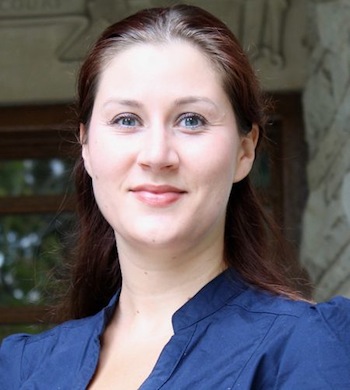Graduate student conference examines boundaries of law
May 28, 2015
Is law a positive tool for regulating actions or a coercive force and a means of perpetuating inequalities - or both? Those were some of the questions debated and discussed at Western Law’s first Interdisciplinary Graduate Student conference, held May 21-22.
The conference, “Law: Helping Hand or Iron Fist?”, encouraged scholars to identify, examine, and challenge the potential boundaries of law and its positive and negative aspects.
The conference was the initiative of Western Law PhD candidate Kirsten Stefanik (pictured left) who acted as chair and organized the conference with assistance from other Western Law graduate students.
 “It was an excellent forum for emerging scholars to develop new ideas, concepts, and approaches to law and other disciplines,” says Stefanik.
“It was an excellent forum for emerging scholars to develop new ideas, concepts, and approaches to law and other disciplines,” says Stefanik.
“Hearing ideas from such a wide range of young scholars was very inspiring. There are no problems that can be solved with just one field of expertise. That’s what made the conference so exciting.”
Graduate students came from across Canada, the U.S. and as far as Brazil to discuss the intersection between law and other disciplines and present on a vast array of issues. Disciplines represented included history, political science, gender studies, and applied mathematics.
Panels included Environment and the Law, Gender and Reproductive Rights, Religious and Cultural Freedoms and Exercise of State Power.
Presentations ranged from “Should elephants have standing?” to “Canada’s new prostitution laws” and participants discussed and debated issues from consent in sexual assault cases to the concept of citizenship in an increasingly globalized world.
Keynote speaker Justice Deborah Livingstone opened the conference, speaking on her journey as Middlesex County’s first female judge and on the formation of the mental health courts in London. She explained how these courts can act as tool to address the root issues which bring some mentally ill individuals into conflict with the law, and how they exemplify the helping hand taking over from the iron fist of the criminal law.
On day two, the second keynote, Professor Robert Solomon, gave a rousing lecture about his research on decision making in end-of-life care. Attendees received an education on Canadian law and jurisprudence framing the issue that acted as a springboard for an exciting and lively discussion.
Erika Chamberlain, Associate Dean (Academic), expressed pride that the Faculty’s young graduate program had reached this milestone.
“The conference demonstrated the scholarly maturity of our graduate program and highlighted our students’ innovative research.”
Chamberlain also noted her appreciation for the many faculty members who volunteered to moderate panels and shared their expertise with student participants. “It was great to see such a rich intellectual exchange.”






